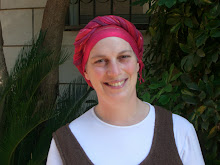
I know, I hang out with my kids all the time, not just on Yom Kippur. During the week, I have the benefit of our beloved art box, our books-on-tape, our computer. On Shabbat we pull out the boxes of games, the puzzles, the magnets. Actually, Shabbat can be a lot of fun, because I don't have to dash off anywhere, so I have time to play with the kids properly. Shabbat, clearly, is where it's all at (and I believe the Torah has something to say about this too.)
Rosh HaShanah davenning is long - well, we have a lot to say - and offers a kind of shul dilemma warm up for Yom Kippur, with one crucial difference: food. And what a difference it is. Aside from the comfort we can get from food (it's delicious!) and the celebratory spirit it can provide (Shabbat treats!), it is also a source of
nourishment. And when we are under-nourished, we might get - how can I say this nicely? - a little cranky. What with the blood sugar going wild and our bodies dehydrating from the inside out, Yom Kippur doesn't bring out the best in us. Which impacts us the most, I find, when we try to communicate with other people. Especially little, needy people.
So here is the conundrum: Yom Kippur davenning is Really Really Long AND we have kids under the age of 10. We do, and guess what? they need a little entertaining.
Now, in this here religious world of ours, a lot of families have kids, thank God. And a lot of those kids are under the age of 10. How exactly are we supposed to juggle our family needs with our davenning needs? And how is one fasting parent supposed to provide food, fun and safety while their brain cells and energy fade at remarkable speed as the day progresses?
You're hoping I have answers to these questions.
I do not.
I'll tell you what helped me yesterday, though. Firstly, I spent most of the day with a friend, and the kids either played together or screeched at each other, but at least we had the company of another adult to keep each other sane, and sometimes even laughing.
Secondly, I belong to an awesome email support group, for frum mothers of kids with special needs. The list represents children with a wide range of emotional, physical and behavioural issues. One amazing woman collates a list for the Yamim Noraim of children (and a few adults) in need of our tefilot, for a refuah shelemah, for chizuk, for success with a surgery or a therapy. These kids are all from the list or a friend of someone on the list. I printed out the list, and carried it around with me on Yom Kippur. I did daven for everyone listed, and I think that was the goal when it was collated. But the list itself was my inspiration: it was 6 pages long. Can you picture it: a list of names of children, submitted by mothers, printed in small print, 6 pages long. How much love was represented by those pages, and how many tears? It gave me the opportunity to daven with the most kavannah of the day; prayers for children are rarely muddied by doubt or boredom.
Another impact of this list of children's names was learning appreciation. When I saw, for example, a request to daven for the success of physical therapy so that a child could learn to walk, I realised was what a nes it is to be able to walk. The most perfect body is one in which we feel nothing. We walk without noticing, we eat with no stomach ache, we turn around automatically. As soon as we sprain an ankle, have a gastric flu, or injure our necks - we become super-aware of that part of our body that allows us - typically - to function. When we get well, how miraculous it seems that our bodies usually work so effortlessly. And that is what I thought about as I davenned, what blessings I have, every moment of every single day.
These thoughts didn't help me clear the table, feed the kids or play with them. But they did help keep me centred on the specialness of Yom Kippur. It isn't
just the day of watching kids. It is a day for praying for them, and praying for ourselves to be good guides for them.
(photo credit: http://www.kavewall.com/toys-games/index.htm)


















